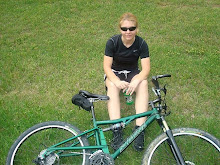I spend so much time worrying about the life of my mind: reading, writing, making godforsaken (but really helpful) charts, making sure I know who said what about whom and when. "Chain-linked" citations are impressive but can be unethical, writes Bud Goodall, yet my field still swoons when someone pulls a 12-name list of authors out of their back pocket. TaDA!
This post isn't really about the constraints of the discipline or how I see the concept of expertise at work in my life. It's about my back. And my legs. And sometimes even my head (but only the muscles and connectives that attach it to my neck).
Academics--especially those in training--boast impressive injury and illness rap sheets. I have friends with sciatica, migraines, ulcers, carpal tunnel syndrome, and less-serious-but-still-painful soreness and stiffness. I know people who are forever battling colds and the flu, hacking their way to a PhD, hobbling their way up and down Hodges library stacks, bent double like little old women carrying too many baskets of home-baked cookies. (The cookies were too much, right? I over-modify.) Until two years ago, I was an academic invalid too: stomach illnesses (which you can read about on this blog somewhere); a weak core from sitting too long at the computer (that one left me with lockjaw and legally blind for about two weeks. Yes, blind.); numbness in my hands from my keyboard position (wiggling the fingers every five minutes = strange looks from other lab users); and a host of sinus infections, eye infections, lung infections, and common colds. I was sick all the time, and my steady diet of processed food (Velveeta grilled cheese sandwiches were a staple), bargain-basement energy drinks, little to no exercise, and too much clicky clicky typing set me up to fail. Though I was committed 100 percent to working on my life of the mind, I wasn't giving myself a hospitable environment in which to do it.
The revolution was less of a bang, more of a whimper. I gradually switched to a diet comprised almost entirely of clean foods, started exercising with purpose, blocked out a least eight hours of sleep a night, and scheduled weekends off. That's right. I don't work on Saturdays at all, and I work on Sundays only when it's dire. Over the course of the last four years, I've steadily improved that plan, and this year, I've had only one serious illness--a terribly timed stomach flu--and a tangle with some antibiotics for a lingering stomach infection. In comparison, in 2006, I battled pneumonia for 6 weeks at at time 3 different times. (That's more than 4 months of being sick with pneumonia.) I sleep more soundly, I've dropped about 50 pounds, and I'm generally happier. In part, this change is attributed to the higher quality of food I'm consuming and because I block out time to exercise at least once a day, usually twice. However, I've also grown to realize that my time away from my work is just as important. I try to NOT work at home, so that all I have to do when I get home is relax. Work is for work. Home is for home things like watching films, snuggling, napping, and reading for pleasure. (I mention this point because many academics I know work from home, and I'm not saying that compartmentalizing tasks this way works for everyone, but it works for me.)
I guess it's safe to say that, while I value the life of my mind, I'm more interested in maintaining a healthy, sustainable life for my body so we can co-exist in peace. Without migraines.
23 August 2010
Subscribe to:
Post Comments (Atom)

2 comments:
This is such a healthy perspective, and you're sure to keep your sanity (and your health!) while others might lose it during what is no doubt a stressful time in your life.
Thanks, Erin! I guess I downplay the stress because I don't tend to make it the center of my life. I think, on one hand, I'm a really crappy grad student because of that. On the other, though, I'm happy. :)
AND YOU'RE HAVING A BABY! Congrats again!
Post a Comment